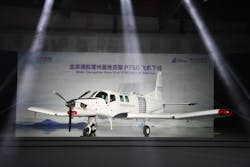Kiwi-China Aviation JV Manufacturing Plant Opening Just The Start
Pacific Aerospace along with its Chinese joint-venture will announce further plans to grow China’s general aviation sector at the upcoming aviation spectacular Airshow China, just days after opening a big custom-built aircraft manufacturing plant at Changzhou.
The opening of the 10-hectare facility at Changzhou airport on October 21, attended by several hundred Chinese and New Zealand businesspeople, joint venture leaders and Chinese and New Zealand government officials and plant workers, celebrated the company’s first aircraft, a reassembled P-750 XSTOL, to roll out through the new facilities. The P-750 XSTOL is the world’s most versatile utility aircraft, pioneered in New Zealand.
The aircraft, registration number XL204, was flown immediately after the plant opening to Zhuhai in Guangdong, where it will participate from November 1-6 in the China International Aviation & Aerospace Exhibition, also known as Airshow China, the largest aviation event in mainland China.
Pacific Aerospace and joint venture chief executive, New Zealander Damian Camp said the new company would announce at the Zhuhai airshow at least two major initiatives to spur general aviation sector development in China, as well as showcasing the P-750 aircraft in “a significant demonstration that we are in this market and serious about it”.
“The participation of P-750 XL204 shows we are committed to development of the Chinese market. We will be making some announcements about our skydiving industry development plans. We plan to have established 50 drop-zones by 2020,” said Camp.
“We’ll also be making an announcement about a new business agreement for aircraft maintenance, repair and overhaul with the Chengdu HuaTai Aviation Technology Company.”
The new joint venture between the New Zealand aircraft maker, Hamilton-based Pacific Aerospace Limited, and China’s leading general aviation company, Beijing General Aviation Company, a subsidiary of the giant Beijing Automotive Group, has been quick to identify the opportunities for business development and growth outside of light aircraft manufacture for China’s emerging general aviation market.
They included skydiving, fast becoming popular among younger, increasingly affluent Chinese, and services to other general aviation companies, including aircraft management and maintenance. Pilot and engineering training is also on the joint venture’s business growth radar.
The joint venture is called Beijing Pan-Pacific Aerospace Technology (BPAT).
The official opening of the joint venture’s purpose-built Changzhou assembly plant, not long after the joint venture was formed, was a clear demonstration of the serious commitment of the business collaboration to fulfilling the Chinese government’s aim to grow the general aviation industry to help improve transport infrastructure support to its rural populations, Camp said.
The Changzhou plant would roll out more than 10 P-750 aircraft in the next few months.
The P-750, which can seat 10 passengers, can be adapted for multiple uses from medical and emergency evacuation and patrol and security surveillance, to skydiving, agricultural, survey and aerial mapping. XSTOL stands for extreme take-off and landing capabilities. The aircraft can take off on short runways, climb quickly and land in equally short order.
The Changzhou plant would roll out 100 aircraft a year, including the smaller, multi-purpose utility aircraft, the E-350 Expedition, a type design recently acquired by Pacific Aerospace’s purchase of Canadian company Found Aircraft’s assets, said Camp. Found Aircraft was originally established by legendary Bud Found and his brother Sherman "Micky" Found. It was also planned to produce at Changzhou the Pacific Aerospace pilot training light aircraft, the CT-4E AirTrainer.
Camp said the opening of the new plant, in one of China’s leading business cities, was a game-changer for the 67 year old New Zealand plane maker, and a significant development in China’s drive to massively increase its general aviation industry. General aviation is distinct from commercial passenger and military aviation and is considered a vital part of any developed economy, providing infrastructure support to populations through aviation links.
The initial primary focus of the new plant in China would be assembly of aircraft from kits supplied by Pacific Aerospace in New Zealand and its existing supply base.
“Our Changzhou facility is the world’s newest general aviation plant and what’s more, we’ve got plenty of space to expand to meet the growing demand from the Chinese market.”
The joint venture had business development plans outside of aircraft manufacture. “We are offering all that is required to grow that general aviation industry,” he said.
Aircraft for export will continue to be manufactured on the Hamilton campus, where Pacific Aerospace currently employs 150 people, and is training Chinese staff.
Camp says the joint venture followed corresponding searches by Hamilton’s Pacific Aerospace and Beijing Automotive for reputable, highly capable partners in the quest to develop China’s general aviation strength.
“For our part we can pick up on the manufacturing expertise of Beijing Automotive and have better access to the China market by having more Chinese content in aircraft. This is the biggest development in Pacific Aerospace’s history and critically important as we see demand for the P-750 and the new E-350 increase.”
Beijing Automotive Group is ranked No 160 on the Fortune 500 Global index. It had revenues last financial year of US$55 billion (NZ$77 billion) and employs 126,000 people.
